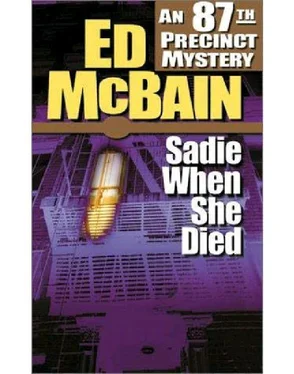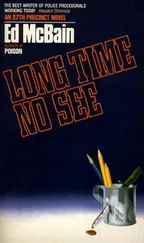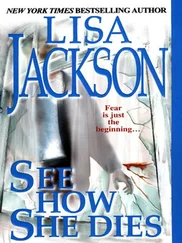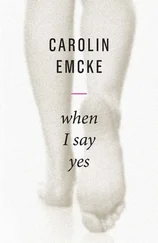Ed McBain - Sadie When She Died
Здесь есть возможность читать онлайн «Ed McBain - Sadie When She Died» весь текст электронной книги совершенно бесплатно (целиком полную версию без сокращений). В некоторых случаях можно слушать аудио, скачать через торрент в формате fb2 и присутствует краткое содержание. Жанр: Полицейский детектив, на английском языке. Описание произведения, (предисловие) а так же отзывы посетителей доступны на портале библиотеки ЛибКат.
- Название:Sadie When She Died
- Автор:
- Жанр:
- Год:неизвестен
- ISBN:нет данных
- Рейтинг книги:4 / 5. Голосов: 1
-
Избранное:Добавить в избранное
- Отзывы:
-
Ваша оценка:
- 80
- 1
- 2
- 3
- 4
- 5
Sadie When She Died: краткое содержание, описание и аннотация
Предлагаем к чтению аннотацию, описание, краткое содержание или предисловие (зависит от того, что написал сам автор книги «Sadie When She Died»). Если вы не нашли необходимую информацию о книге — напишите в комментариях, мы постараемся отыскать её.
Sadie When She Died — читать онлайн бесплатно полную книгу (весь текст) целиком
Ниже представлен текст книги, разбитый по страницам. Система сохранения места последней прочитанной страницы, позволяет с удобством читать онлайн бесплатно книгу «Sadie When She Died», без необходимости каждый раз заново искать на чём Вы остановились. Поставьте закладку, и сможете в любой момент перейти на страницу, на которой закончили чтение.
Интервал:
Закладка:
1
Detective Steve Carella wasn’t sure he had heard the man correctly. This was not what a bereaved husband was supposed to say when his wife lay disemboweled on the bedroom floor in a pool of her own blood. The man was still wearing overcoat and homburg, muffler and gloves. He stood near the telephone on the night table, a tall man with a narrow face, the vertical plane of which was dramatically broken by a well-groomed gray mustache that matched the graying hair at his temples. His eyes were clear and blue and distinctly free of pain or grief. As if to make certain Carella had understood him, he repeated a fragment of his earlier statement, giving it even more emphasis this time around.
“ Very glad she’s dead,” he said.
“Sir,” Carella said, “I’m sure I don’t have to tell you . . .”
“That’s right,” the man said, “you don’t have to tell me. It happens I’m a criminal lawyer. I am well aware of my rights, and fully cognizant of the fact that anything I tell you of my own free will may later be used against me. I repeat that my wife was a no-good bitch, and I’m delighted someone killed her.”
Carella nodded, opened his pad, glanced at it, and said, “Are you the man who notified the police?”
“I am.”
“Then your name is Gerald Fletcher.”
“That’s correct.”
“Your wife’s name, Mr. Fletcher?”
“Sarah. Sarah Fletcher.”
“Want to tell me what happened?”
“I got home about fifteen minutes ago. I called to my wife from the front door, and got no answer. I came here into the bedroom and found her dead on the floor. I immediately called the police.”
“Was the room in this condition when you came in?”
“It was.”
“Touch anything?”
“Nothing. I haven’t moved from this spot since I placed the call.”
“Anybody in here when you came in?”
“Not a soul. Except my wife, of course.”
“And you say you got home about fifteen minutes ago?”
“More or less. You can check it with the elevator operator who took me up.”
Carella looked at his watch. “That would have been ten-thirty or thereabouts.”
“Yes.”
“And you called the police at . . .” Carella consulted the open notebook. “Ten thirty-four. Is that right?”
“I didn’t look at my watch, but I expect that’s close enough.”
“Well, the call was logged at . . .”
“Ten thirty-four is close enough.”
“Is that your suitcase in the entrance hallway?”
“It is.”
“Just returning home from a trip?”
“I was on the Coast for three days.”
“Where?”
“Los Angeles.”
“Doing what?”
“An associate of mine needed advice on a brief he’s preparing.”
“What time did your plane get in?”
“Nine forty-five. I claimed my bag, caught a taxi, and came directly home.”
“And got here about ten-thirty, right?”
“That’s right. For the third time.”
“Sir?”
“You’ve already ascertained the fact three times. If there remains any doubt in your mind, let me reiterate that I got here at ten-thirty, found my wife dead, and called the police at ten thirty-four.”
“Yes, sir, I’ve got that.”
“What’s your name?” Fletcher asked suddenly.
“Carella. Detective Steve Carella.”
“I’ll remember that.”
“Please do.”
While Fletcher was remembering Carella’s name; and while the police photographer was doing his macabre little jig around the body, flashbulbs popping, death being recorded on Polaroid film for instant verification, pull, wait fifteen seconds, beep, rip, examine the picture to make sure the lady looks good in the rushes, or as good as any lady can look with her belly wide open and her intestines spilling onto a rug; and while two Homicide cops named Monoghan and Monroe beefed about being called away from their homes on a cold night in December, two weeks before Christmas; and while Detective Bert Kling was downstairs talking to the elevator operator and the doorman in an attempt to ascertain the exact hour Mr. Gerald Fletcher had pulled up in a taxicab and entered the apartment building on Silvermine Oval and gone up in the elevator to find his once-beautiful wife, Sarah, spread amoeba-like in ugly death on the bedroom rug; while all this was happening, a laboratory technician named Marshall Davies was in the kitchen of the apartment, occupying himself with busy work while he waited for the Medical Examiner to pronounce the lady dead and state the probable cause (as if it took a genius to determine that someone had ripped her open with a switchblade knife), at which time Davies would go into the bedroom and with delicate care remove the knife protruding from the blood and slime of the lady’s guts in an attempt to salvage some good latent prints from the handle of the murder weapon.
Davies was a new technician, but an observant one, and the first thing he noticed in the kitchen was that the window was wide open, not exactly usual for a December night when the temperature outside hovered at twelve degrees Fahrenheit, not to mention Centigrade. Davies leaned over the sink and further noticed that the window opened onto a fire escape on the rear of the building. Whereas he was paid only to examine the superficial aspects of any criminal act—such as glass shards in a victim’s eyeball, or shotgun pellets in the chest, or, as in the case of the lady in the other room, a knife in the belly—he could not resist speculating that perhaps someone, some intruder, had climbed up the fire escape and into the kitchen, after which he had proceeded to the bedroom, where he’d done the lady in.
Since there was a big muddy footprint in the kitchen sink and another one on the floor near the sink, and several others fading in intensity as they traveled inexorably across the waxed kitchen floor to the door that led to the living room, Davies surmised he was onto something hot. Wasn’t it entirely possible that an intruder had climbed over the windowsill and into the sink and walked across the room, bearing the switchblade knife that had later been pulled viciously across the lady’s belly from left to right, like a rip-top cellophane tab, opening her as effortlessly as it would have a package of cigarettes?
Davies stopped speculating, and photographed the footprint in the sink and the ones on the floor. Then, because the Assistant M.E. was still fussing around with the corpse (Death by stab wound, Davies thought impatiently; evisceration, for Christ’s sake!) and seemed reluctant to commit himself without perhaps first calling his superior officer or his mother (Say, we’ve got a tough one here, lady’s belly ripped open with a knife, got any idea what might have caused death?), Davies climbed out onto the fire escape and dusted the lower edge of the window, which the intruder would have had to grab in order to open the window, and then for good measure dusted the iron railings of the ladder leading up to the fire escape.
Now, if the M.E. ever got through with the goddamn body, and if there were any latent prints on the handle of the knife, the boys of the 87th would be halfway home, thanks to Marshall Davies.
He felt pretty good.
Detective Bert Kling felt pretty lousy.
His condition, he kept telling himself, had nothing to do with the fact that Cindy Forrest had broken their engagement three weeks before. To begin with, it had never been a proper engagement, and a person certainly couldn’t go around mourning something that had never truly existed. Besides, Cindy had made it abundantly clear that, whereas they had enjoyed some very good times together, and whereas she would always think upon him fondly and recall with great pleasure the days and months (yea, even years) they had spent together pretending they were in love, she had nonetheless met a very attractive young man who was a practicing psychiatrist at Buenavista Hospital, where she was doing her internship, and seeing as how they shared identical interests, and seeing as how he was quite ready to get married whereas Kling seemed to be married to a .38 Detective’s Special, a scarred wooden desk, and a detention cage, Cindy felt it might be best to terminate their relationship immediately rather than court the possibility of trauma induced by slow and painful withdrawal.
Читать дальшеИнтервал:
Закладка:
Похожие книги на «Sadie When She Died»
Представляем Вашему вниманию похожие книги на «Sadie When She Died» списком для выбора. Мы отобрали схожую по названию и смыслу литературу в надежде предоставить читателям больше вариантов отыскать новые, интересные, ещё непрочитанные произведения.
Обсуждение, отзывы о книге «Sadie When She Died» и просто собственные мнения читателей. Оставьте ваши комментарии, напишите, что Вы думаете о произведении, его смысле или главных героях. Укажите что конкретно понравилось, а что нет, и почему Вы так считаете.












